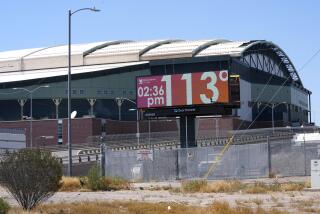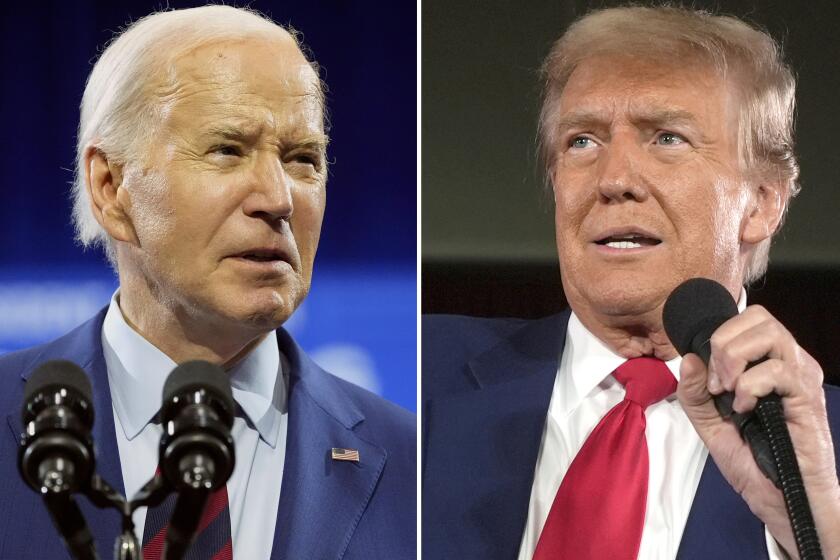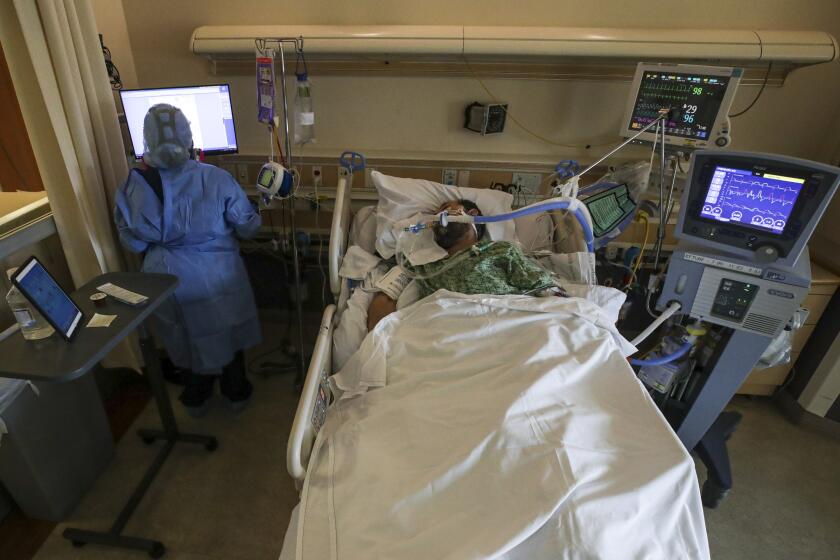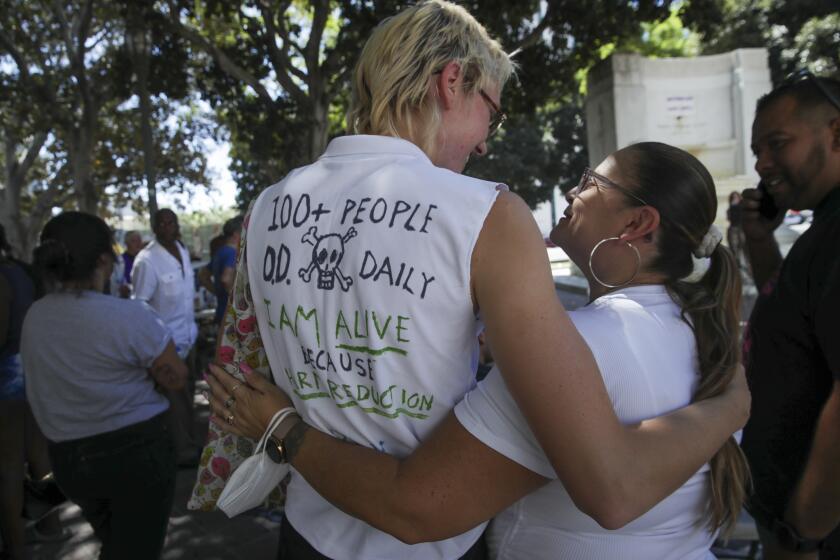Iraqis Amend Charter to Ease Sunni Ire
Three days before a draft constitution goes to voters in a referendum, Iraqi leaders amended the charter Wednesday in an effort to draw the country’s Sunni Arab minority away from the violent insurgency and into politics. But many Sunnis rejected the compromise and insurgents struck again, killing at least 30 people in a bombing.
In a nationally televised evening ceremony before a gathering of diplomats and politicians, Iraq’s Shiite Muslim, Kurdish and secular factional leaders formally proclaimed the changes without a vote by the 275-member elected National Assembly.
The amendments brokered by U.S. Ambassador Zalmay Khalilzad during a week of intense negotiations persuaded one prominent Sunni group, the Iraqi Islamic Party, to call for a “yes” vote in Saturday’s referendum. The multi-faction agreement, reached late Tuesday, split the diffuse leadership of the Sunnis, which had been campaigning almost universally against the proposed charter.
President Jalal Talabani and Iraqi leaders across the country’s ethnic and sectarian divides predicted Wednesday that the constitution would be approved. Sunnis make up about 20% of the population but are dominant in three of the 18 provinces; rejection of the proposed charter by two-thirds of the voters in any three provinces would be enough to defeat it.
As word of the accord spread Wednesday, an insurgent detonated a belt packed with explosives in the midst of volunteers at a police recruiting center in Tall Afar. It was the second suicide bombing in as many days in the small, ethnically mixed city in northwestern Iraq. At least 60 died in the two attacks.
American officials had warned that the Sunni-led insurgency targeting the 140,000 U.S. troops and Iraq’s coalition government dominated by Shiite and Kurdish factions would swell if the constitution passed over strong Sunni opposition.
“The insurgency cannot and will not be defeated by military means alone,” Khalilzad told reporters after the evening ceremony. “The military instrument has to be integrated into a larger strategy that’s largely political.”
In welcoming the accord, however, White House Press Secretary Scott McClellan said the Bush administration expected to see “continued violence because the terrorists understand how high the stakes are in Iraq.”
The most significant of the eight amendments Wednesday gives the new National Assembly that will be elected Dec. 15 a mandate to set up a committee that would have four months to recommend further changes to the constitution.
That opens a window of opportunity early next year for amendments that could be put before voters by a simple majority of the next assembly rather than the two-thirds vote required before Wednesday’s announcement.
And it gives Sunni parties, which boycotted the election of the current transitional assembly last January, an incentive not only to participate in Saturday’s referendum but also to organize and take part in the December election to bolster their numbers in the new legislature.
The accord does not directly address the Sunnis’ biggest objection to the draft constitution -- the provision for remaking Iraq into a loose federation with a weak central government, a highly autonomous Kurdish north and possibly an oil-rich, Shiite state in the south. Most Sunnis live in the resource-poor center and west.
But Sunni negotiators said they hoped to make at least marginal changes to the federal system if they gained enough seats in the next assembly.
“The constitution is a sick man,” said Tariq Hashemi, the Iraqi Islamic Party’s secretary-general. “This sick man now has permission to go to a hospital.”
Leading members of the Muslim Scholars Assn., a powerful group of Sunni clerics, rejected the accord and urged their followers to vote against the draft. So did the National Dialogue Council, a Sunni umbrella group that includes members of deposed President Saddam Hussein’s Baath Party and hard-line Arab nationalists.
“This constitution will divide Iraq,” said Saleh Mutlak, a spokesman for the council.
More important, he added, the agreement preserves veto power by any three provinces over future constitutional amendments -- a power that could be wielded by the predominantly Kurdish or Shiite provinces over proposals to water down their autonomy. “This means the constitution will stay as it is for decades to come,” Mutlak said.
The accord includes a symbolic amendment to answer the Sunnis’ objection to federalism. It inserted the phrase, “This constitution is a guarantee for the unity of Iraq.” Another amendment makes Arabic, along with Kurdish, an official language in the north.
Sunnis also had objected to a constitutional article barring former members of the Baath Party from public office. Sunni negotiators won guarantees that party membership “is not grounds for prosecution” in the courts and that decisions by a government panel set up to purge former Baathists from office will be subject to approval by the assembly.
It was unclear Wednesday whether the accord would translate into a large “yes” vote by Sunnis.
The Iraqi Islamic Party was the only Sunni group involved in the negotiations with Kurdish and Shiite leaders; its relative strength among Sunnis is unclear because it has never been tested in elections.
The party at first supported the U.S.-led Coalition Provisional Authority that ruled Iraq for more than a year after Hussein’s ouster in March 2003 but now backs peaceful opposition to the American-led military presence. For U.S. officials working to achieve the accord, the party was “the easiest fruit to pick” among the Sunni political groups, said Nathan Brown, an Iraq expert at the Carnegie Endowment for International Peace in Washington.
Hashemi, the party’s secretary-general, called the amendments “a major concession” by the Shiites and Kurds that would heal the country’s divisions and speed the withdrawal of U.S. troops.
Minutes before Hashemi spoke to reporters at party headquarters, a tall bodyguard reached above the dais and tore down a banner that read, “For the sake of Iraq, we reject the constitution.”
Talabani, a Kurd, called the agreement “the beginning of a new kind of cooperation among all Iraqis” and emphasized the flexibility of Iraq’s nascent democratic system. “The only book that cannot be changed is the Koran,” he said.
But many Shiite and Kurdish leaders played down the changes as largely cosmetic.
“These are merely assurances we gave to the Sunnis to keep them engaged,” said Saad Jawad, a Shiite negotiator. “It will enhance the ‘yes’ vote. But what is at stake is not the referendum but the whole political process.”
But Farid Ayar, a member of the commission organizing the referendum, said Kurdish and Shiite negotiators were willing to make compromises because they feared a large, if not decisive, “no” vote in the Sunni provinces. He said Sunnis who boycotted the January election had registered in large numbers for the referendum.
Iraqi officials said Khalilzad’s pressure and cajoling were a key factor in the compromise. The envoy has worked for months trying to keep Iraqis to a timetable for drafting the constitution and holding the referendum.
“I think Zal Khalilzad can take most of the credit for this,” said British Ambassador William Patey. The Americans “were quite tough in saying to people who were quite content to sit on the constitution as it was, that it was worth a final effort to get more Sunnis on board. That sort of rationale was put over quite forcefully.”
More to Read
Start your day right
Sign up for Essential California for news, features and recommendations from the L.A. Times and beyond in your inbox six days a week.
You may occasionally receive promotional content from the Los Angeles Times.






